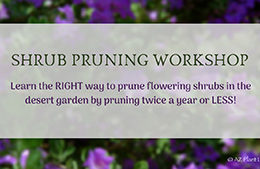Have you ever had a ‘substitute’ teacher? As most of you know, a substitute teacher doesn’t do things the same way our regular teacher does.
A few years ago, I was asked to step in as a ‘substitute’ gardener for my father-in-law’s landscape.

Photo: Meticulously pruned desert ruellia (Ruellia peninsularis)
My father-in-law had always been a meticulous gardener and took a lot of pride in his landscape. Have you ever seen rounder shrubs?
A few years earlier, I had designed the landscape around his new home and tried to convince him to allow his plants to grow into their natural shapes. But as you can see from the photo above, he didn’t follow my advice.
He eventually took out his backyard grass and replaced it with artificial turf and whenever flowers or leaves would fall on the grass, he would vacuum them up – I’m not kidding.
We would often joke with each other about our very different styles of gardening – especially when he would come over to my house for a visit and see my plants growing “wild and free” as he would say.
But despite our differences, we shared the same love for plants and the garden.
Unfortunately, his gardening days were numbered and he asked me to come over and help him with the gardening tasks that he could no longer do.
My father-in-law was diagnosed with ALS (Lou Gehrig’s disease) in October 2010 and it progressed very rapidly.
So, I became his ‘substitute gardener’ and I was happy to be able to help out so that he could still enjoy the beauty of his garden, even if he could not care for it himself.

In early August of 2011, I lightly pruned back his gold lantana. At this point, my father-in-law spent most of his time indoors sitting down. But, as I was pruning, I saw him slowly make his way out, with his walker, so he could watch me prune his plants.
At this point, he could no longer talk due to ALS and I’m certain that if he could have spoken, he might have asked me to make the lantana ’rounder’.
After this light pruning, the lantana would grow back to its original size before stopping during winter. If they had not been pruned, they would have look quite overgrown for my father-in-law’s taste.
Light pruning involves removing 1/3 or less. The timing of this light pruning is crucial – prune too late and your plants will be extra susceptible to damage from frost. Don’t prune after early August in zone 9 (July in zone 8) gardens. Pruning in fall should not be done for this very reason.

Substitute Gardener
Another part of the garden that my father-in-law took a lot of pride in was his flowering annuals. Every year, he would plant the same red geraniums and white-flowering bacopa in winter. Once spring rolled around, he would plant red and white vinca. He never deviated by trying out newer colors or varieties.
I found myself taking over this job as well and when I came home and see all there was to do in my neglected garden – I didn’t mind. It felt so good to be able to control how his garden looked because ALS had taken control of everything else.
My father-in-law died in September 2011, just 11 months after being diagnosed with ALS.
It’s been almost 3 years since he passed away, but whenever August comes around and I find myself lightly pruning back my gold lantana – I enjoy the memory of one our last moments together in the garden as I pruned his lantana.
Pruning Flowering Shrubs in Late Summer





































